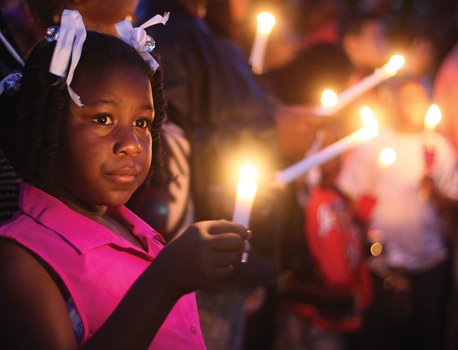Police, prosecutors rely on community
Joey Matthews | 12/9/2014, 5:55 a.m.
Fifteen-year-old Zyemontae Redd lay dead inside a bullet-riddled apartment in Richmond’s Mosby Court.
Police, responding to a call, discovered his body. They also found two others who had been wounded by gunfire, including one who was Zyemontae’s 16-year-old cousin.
A large group of people gathered to watch the horrific scene, now filled with police officers, homicide investigators and emergency personnel.
“As the two injured men were being loaded into ambulances, people on the street were running up to them saying, ‘Don’t tell them anything. Don’t snitch. Don’t snitch,’ ” Richmond Police Lt. James Laino recalled.
He shook his head.
“It’s very frustrating.”
Lt. Laino supervises 23 officers in the Richmond Police Department’s homicide unit. They are part of an intensive and collaborative effort by prosecutors and other departments to curb violence in the city.
During the last six years, Richmond has experienced its deepest drop in homicides since 1967, with roughly 38 deaths each year on average, according to police department statistics.
Lt. Laino attributed the decline to more intensive community policing efforts and stiffer sentences for violent offenders.
And while community members pitch in to help police solve many homicides, that’s not always the case, Lt. Laino said. Sometimes, even family members refuse to help — and sometimes block — the efforts of Richmond Police to solve these crimes.
He offered the alarming initial response in the Coalter Street triple shooting as an example of community blocking.
Only later did others come forward, he said, which helped lead detectives to a 16-year-old suspect who has been charged in the case.
His frustrations were shared by Richmond Commonwealth’s Attorney Michael N. Herring and veteran prosecutor Learned Barry, a deputy commonwealth’s attorney, in a Free Press interview.
“In one breath, some people say, ‘Go find the person who did it.’ But in the other breath, they say, ‘But we don’t want to help you do it,’ ” said Mr. Herring, whose office prosecutes the homicide cases. “Sometimes it’s relatives and friends of the victim who won’t talk.
“There are a small, but unacceptable number of homicide cases we have to solve despite the community,” he added.
Mr. Herring said he stopped attending most vigils for homicide victims because too many of the people crying out the loudest for justice at the solemn occasions “don’t talk to the police or us.”
“But they probably have a whole lot to say” that could lead to the killer’s capture, he said.
Mr. Barry, who has successfully worked hundreds of homicide cases in his 36 years as a prosecutor, lashed out at those who refuse to help in homicide investigations.
“It’s very frustrating,” he said. “Everybody wants us to catch the bad guy, but nobody wants to put any skin in the game,” he said.
Mr. Herring said he’s aware some people don’t help police or prosecutors because of a lack of trust or fear of retaliation from criminal elements if they provide information.
Most of the killings in Richmond are black-on-black crime, he said, and when people in predominately black communities won’t help law enforcement bring killers to justice, “it tells me these people really don’t care about the African-American community.”
Mr. Barry said recent police chiefs, including current Chief Ray Tarasovic, and his boss, Mr. Herring, have added more resources to investigate and prosecute homicides.
Mr. Herring, who has led the Commonwealth’s Attorney’s Office for nine years, said he has been able to retain more veteran prosecutors, who traditionally left for better paying jobs once they became effective trial lawyers.
“That has allowed us to bring to trial and successfully prosecute more homicide cases,” he said.
The police and Commonwealth’s Attorney’s Office also now work more in union, Mr. Barry added, to solicit and protect those who cooperate in the prosecution of homicide cases by offering them anonymity to the fullest extent possible, perhaps a monetary reward for their help, and sometimes relocating witnesses and their families to ensure their safety.
Lt. Laino said the department does not keep data on how many homicides they solve getting help from the community from programs such as Crime Stoppers. He said anonymous tips are a major tool in solving some cases.
Figures show that Richmond police cleared 28 of 37 homicides in 2013, 27 of 44 in 2012 and 29 of 37 in 2011. Many of those were with community help, Lt. Laino said.
As of Nov. 25, police have cleared 27 of 41 homicides so far this year.
Lt. Laino said police are always seeking to build greater trust and bonds with people in crime-plagued neighborhoods in order to thwart criminals and bring them to justice.
They do so by speaking at community meetings, churches and schools and while patrolling neighborhoods. They also participate in National Night Out activities, meet once a month with faith leaders and organize sports and educational opportunities for at-risk youths.
“It’s a team effort,” Mr. Herring said. “We’re all in this together.”
“We really do want to rid neighborhoods of these violent perpetrators and make them safer places for everyone,” Lt. Laino said.







